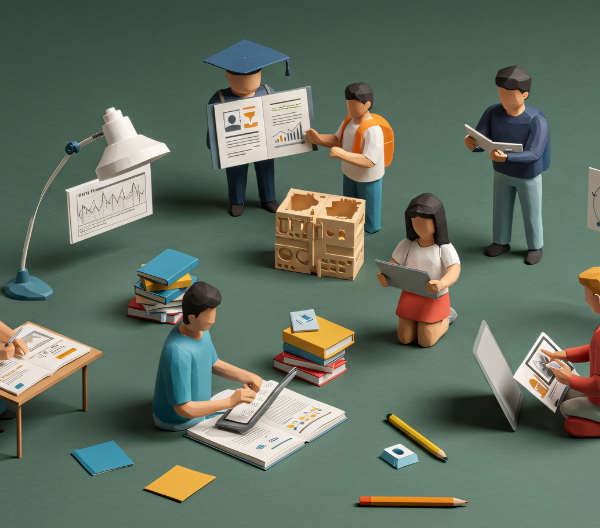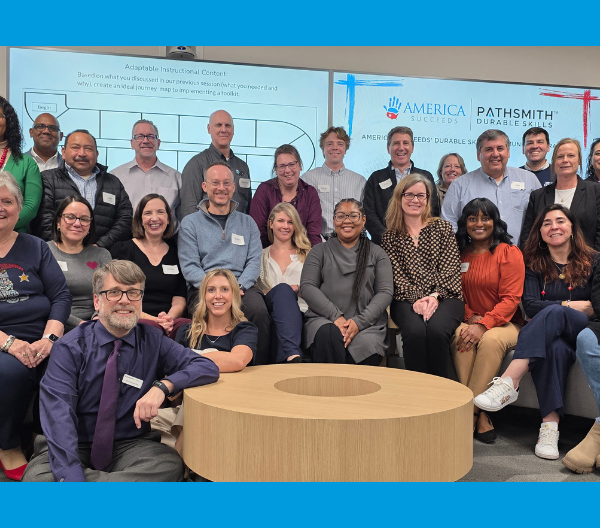In the effort to improve educational outcomes for all learners, America Succeeds is bullish on the idea that an increased emphasis on Durable Skills development across all levels of education will boost learners’ opportunities to gain economic mobility throughout their careers. Key findings from our research report, The High Demand for Durable Skills, showed that in 2021, “seven of the top ten most requested skills in job postings [were] Durable Skills” and that “employers seek these skills nearly 4 times (3.8x) more frequently than the top five technical or hard skills.” By analyzing these findings within the context of the widely-covered skills gap in the American workforce, a compelling case can be made that Durable Skills-focused educational opportunities will give more learners access to high-quality career options that earn them economic mobility and simultaneously help to ease the hiring struggles facing employers across the nation.
Durable Skills development can happen in myriad ways, but one thing is certain – the earlier in life that a person begins to acknowledge their competencies, reflect on their strengths and weaknesses, and practice these skills through interactions with peers, colleagues, mentors, and community members in their lives, the better prepared they will be to enter career pathways that require proficiency in Durable Skills (spoiler alert: that’s pretty much all of them). Thus, it is critical that K-12 education emphasizes the importance of developing Durable Skills and gives learners ample opportunities to practice these skills early in their education journey.
Recent interviews of young professionals around the nation, conducted by America Succeeds, provide anecdotal evidence that Durable Skill development is heavily augmented by parental influence, experience in the workforce, and opportunities to travel and interact with people with diverse perspectives. While interviewees acknowledged that they did practice Durable Skills in school through completion of coursework and collaboration with peers, they also consistently reported that their educational experiences never focused specifically on these skills. These findings illuminate the disconnect between what’s provided in schools and what happens outside of school settings that are a byproduct of one’s life circumstances and economic security.
Given the fact that Durable Skills have long been a topic of interest in the education reform space, a few pertinent questions come to mind. Why aren’t Durable Skills already a focus of primary and secondary education? Is it because of a perceived lack of teachability? How can we use Common Core and other learning standards currently in place to elevate Durable Skills development in the K-12 student experience?
While there is a widely held misconception that Durable Skills are fixed and can’t be taught and developed in the same manner as hard skills, there is a burgeoning body of research that demonstrates the invalidity of this notion. This body of research includes the Skillsline case study, recently published by America Succeeds, highlighting Dr. Ana Greif’s dissertation research in which the Skillsline training platform was implemented at a defense manufacturer’s workspace and produced remarkable results across a ten-week period that speak to the trainable nature of Durable Skills. The central takeaway is that Durable Skills can be developed (across a relatively short time period) if education leaders, teachers, and employers are willing to invest in intentional training models.
Opportunities to participate in extracurricular activities, work-based learning, career and technical education, and networking events with employers and community leaders can provide extensive value to both learners and the communities they are embedded in. These experiences are valuable to learners because Durable Skills are largely developed through the application of knowledge and skills in real-world scenarios. While schools should focus on providing these opportunities for their students, getting the right balance between skills development outside of the classroom and within it is important.
Durable Skills should never be ignored in traditional classroom settings because these skills are proven to be teachable and classrooms are the perfect place to provide directed, low-stakes opportunities for students to practice their Durable Skills and receive feedback on their performance. Schools and educators have a clear opportunity to supplement student development of Durable Skills by tailoring instruction to allow students to recognize and reflect on the Durable Skills they are applying during each lesson.
Intentional instruction of Durable Skills in K-12 education can be simple, like calling out the Durable Skills being practiced during any lesson plan or daily activity to help students reflect on those competencies. It can also be more complex, like implementing structured training programs, such as Skillsline, to focus on the development of specific skills.
It’s important to recognize, however, that Durable Skills don’t have to be taught through a separate program. Most rigorous academic work, whether in core classes or electives, likely include some Durable Skills embedded within. In fact, Common Core standards are filled with descriptions of student competency in Durable Skills.
For example, college and career readiness anchor standards for reading use ten different descriptors of what college and career ready students should be able to do while reading. Of these ten descriptors, at least six describe competency in Durable Skills, such as
delineate and evaluate the argument and specific claims in a text, assessing whether the reasoning is sound and the evidence is relevant and sufficient; recognize when irrelevant evidence is introduced.”
This standard describes the ability to use critical thinking while reading a text. And Durable Skills aren’t limited to ELA standards; the Common Core “standards for mathematical practice” describe an entire suite of Durable Skills applications in the practice of mathematics. And don’t get us started on Next Generation Science Standards…
Instead of treating Durable Skills competency as a byproduct of quality education, educators should capitalize on the presence of Durable Skills in existing academic standards by emphasizing the importance of these skills early in education and helping students to think about the ways in which they are developing them through their everyday learning. Intentionally directing students to understand the value of these skills and the ways they show up in their lives already will drive students to be more conscious about how they use Durable Skills throughout their career development. While schools have the duty to provide students with opportunities to apply and develop these skills outside of the classroom walls, they should also recognize the importance of providing students with the space to practice and receive feedback on Durable Skills development inside the classroom. Striking a balance between practicing Durable Skills in the classroom and developing them in alternative learning environments will give students of all backgrounds the means to become proficient in these skills and use them to access high quality careers.




